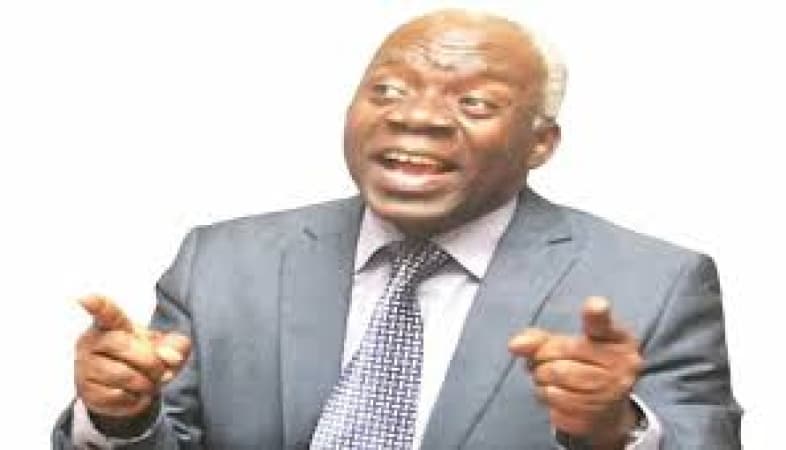
Human rights lawyer, Femi Falana SAN
In this interview, human rights lawyer, Femi Falana, SAN, shares with ISMAEEL UTHMAN his thoughts on the heated confrontation between the Minister of the Federal Capital Territory, Nyesom Wike, and a naval officer in Abuja, examining the legality of the officer’s actions, the minister’s conduct, and what the incident reveals about civil–military relations and governance under President Bola Tinubu
The Minister of the FCT, Nyesom Wike, recently had a faceoff with a naval officer over a land dispute in Abuja. Did the conduct of the naval officer constitute insubordination or a violation of any law?
From the facts and circumstances of the episode, the face-off was totally uncalled for. It is pertinent to know that by virtue of Section 11 of the Land Use Act, the minister of the FCT is empowered to enter and inspect land comprising any statutory right of occupancy or any improvements effected thereon, at any reasonable hours in the day time. The law equally requires the occupier to permit and give free access to the minister to enter and inspect the land. By preventing the minister from gaining access to the land in question, the military officer contravened the law.
The alleged owner of the disputed land, Vice Admiral Awwal Zubairu Gambo, ought to have known that the Constitution and the Armed Forces Act do not permit him to deploy any member of the Armed Forces to guard his landed property in any manner whatsoever. Instead of using force, Admiral Gambo should have sued the minister and sought legal protection. On his part, Lt. Yerima should have declined to be turned into a guard by the retired service chief. The superior order that he is required to obey must be legal and related to military assignments. The particular order in question cannot be said to be legal since guarding a private property is not a military assignment.
The FCT Minister was also criticised for insulting the naval officer and calling him a fool. How better could the minister have handled the matter ?
Since Mr. Wike was obstructed in the performance of his duty, he ought to have withdrawn from the site and proceed to report the officer to the relevant military authorities or file a suit at the FCT High Court for the purpose of obtaining an order to enable him to enter and inspect the land. The conduct of the military officer did not constitute insubordination. Even when the minister was calling him a fool, he politely reacted by saying “I am not a fool, sir”. But the minister went off track when he subjected the military officer to verbal assault, including calling him a fool. But out of sheer maturity, the officer politely said, “I am not a fool, sir.” As a gentleman, the officer refused to be provoked by the minister’s verbal assault. Lt. Yerima is entitled to the fundamental right to the dignity of his person which was violated by the minister. Calling him a fool in a public place is not acceptable. The President should direct Mr Wike to apologise to the military officer.
A colleague of mine has congratulated Mr Nyesom Wike that he was lucky, as he could have been killed for calling a commissioned officer a fool. Frankly speaking, the minister was lucky because the officer did not behave like a General who had ordered the massacre of the 347 Shiites in Zaria and the burial of their bodies in an unmarked grave. That was in December 2015. Because the General has not been brought to book, he has said that Mr Wike threatened national security by confronting a military officer who engaged in an illegal occupation of a disputed land.
There have been arguments and counter-arguments on the legality or illegality of the military officer’s duty on the land. Is it legal for a military or naval officer to be sent to protect a property?
The courts have repeatedly maintained that soldiers cannot be involved in civil matters. Even policemen and other law enforcement officers have been prohibited from involving themselves in civil disputes such as land matters, breach of contract, tenancy matters, debt recovery, etc. The alleged order from above given to Lt. Yerima to guard a private property is illegal in every material particular. The courts have held that no Nigerian can be compelled to obey an illegal order.
In the recent governorship election in Anambra State, the soldiers who took part in the democratic exercise killed a Nigerian while returning to their base in Enugu. Whoever involved the soldiers in the election committed a constitutional sacrilege and a contempt of court. In four separate judgments, the Federal High Court and Court of Appeal, banned soldiers from maintaining law and order during elections in Nigeria. It may interest you to know that the four cases were filed by the APC when the PDP was in power. In Femi Falana v Chief of Army Staff, the Federal High Court held that the Armed Forces lack the power to subject the people of Nigeria to any form of identification and that if citizens were to identify themselves, only the police could perform such a duty. The judgment was delivered in 2019.
The Defence Headquarters released a picture on its social media. The picture seems to suggest an endorsement of the naval officer’s action. The post says: “It is an honour to serve in the Nigerian military. Unshaken, unbent, unbroken.” What do you make of that?
The military establishment will not take any action against the junior military officer as retired officers have queued behind him. In fact, the young officer has become a hero. Unfortunately, successive regimes have failed to demilitarise society. There was a regime that was headed by a retired general and he made sure that the Vice President was a retired custom officer. In addition, the Chief of Staff, National Security Adviser, Minister of Police Affairs were retired military officers. Even the chairman of the ruling party was a retired police officer. Hence, we had a quasi-democratic administration. In the first and second republics, the Chief Security Officer of the President of Nigeria was a police officer. Today, the President is one of the few leaders of a democratic country in the world whose Chief Security Officer is a military standing behind him while addressing local meetings and international conferences.
A retired service chief said that the conduct of the Minister is a threat to national security. What is your comment?
National security means the collective security of the nation. It is not about the security of the people in power or retired military officers. It cannot be personalised. The uniform of a military officer is what it is. It is not different from the uniform of a policeman or a customs officer. All members of the Armed Forces and the para-military forces are serving the nation in different capacities. As IGP Kayode Egbetokun said recently, the police force is the first line of duty. Put differently, the police force is in charge of internal security. The Armed Forces can only be invited to intervene if there is insurrection or a total break-down of law and order. The land in question does not belong to the Federal Government. It belongs to a private citizen whose claim to ownership is being disputed. It is being guarded illegally by soldiers led by a commissioned officer.
The Presidency has remained silent on the incident for over four days. How appropriate is that?
The Federal Government cannot afford to treat this matter with disdain. Two ministers have spoken out against the conduct of Mr Wike. It does suggest that the cabinet is divided over the matter. Two ministers have publicly supported the action of Lt. Yerima without considering the implications of turning him into a guard. Retired service chiefs and other retired military officers have supported the conduct of Lt Yerima and asked that Mr. Wike be called to order. Apart from the service chiefs, members of the public are of the opinion that Mr. Wike went too far by calling Lt. Yerima a fool. So, it has nothing to do with superiority complex. Obviously worried about the turn of events, Mr. Wike has threatened to call it quit if the President cannot protect him.
In 2011, a minister in Ghana who once made derogatory remarks about taxi drivers was made to withdraw the statement by the Atta Mills administration. In 2014, a senior member of the British parliament who referred to policemen as plebs was compelled to apologise to the police officers. No doubt, Mr Wike has regretted his action. Hence, he has denied calling the military officer a fool. But he should proceed to apologise to the officer.
Land disputes have been a recurrent issue between the FCTA and VIPs. How can normalcy and the rule of law be permanently restored?
Land disputes have been a recurrent issue between the FCTA and the Nigerian people resident in Abuja. We handled a case where Justice Kutigi held that consultation has to preceed demolition. Normalcy can only be restored if the authorities are prepared to comply with the provisions of the Land Use Act and the Urban and Regional Planning Act as well as court orders and judgments. Under the Constitution, the minister has no power to demolish the house of any citizen. To appreciate the position of the law, a landlord cannot eject a tenant from a house without a court order. It is a criminal offence to engage in unlawful ejection in Lagos State.
Recently, about 100 houses were demolished in Oworonsoki in defiance of a court order. As the government could not justify its action, it claimed that the court order was not served on the relevant organs of the government. I showed evidence of the service and receipt of the order. But even assuming the order was not even served, can you demolish without a court order? The answer is in the negative. If you cannot eject a tenant without a court order, can you demolish the house without a court order? In one of the recent cases, the Lagos State Government was ordered to pay N3.5bn to the victims of the demolition recently carried out in Makoko. In July 2025, the Federal Capital Territory High Court indicted the minister and building control agencies for illegal demolition of houses. In fact, the court awarded N200m damages against the minister and his demolition squad.
How do you also react to the way Nigerians backed the military officer against Wike?
It shows that Mr Wike has gone overboard on many occasions and got away with his ministerial excesses. Nigerians are totally opposed to a public officer who is arrogant and garrulous. The minister has distanced himself from the law of the land in many respects. But the minister should not be singled out for blame as President Tinubu has maintained that he is very pleased with his performance.
Barely 24 hours after the videos of Wike’s confrontation with the Naval officer went viral on WhatsApp groups, he reportedly banned the use of mobile phones within office premises for all officers on Salary Grade Level 14 and below. Is the ban justified in law?
No. It is totally illegal. It cannot be justified in law. The attention of the minister ought to be drawn to the state of the law on the use of telephones by Nigerians. The right to freedom of expression via telephones cannot be taken away without a court order.
Even the order of the Economic and Financial Crimes Commission requesting visitors to deposit their telephones has been declared illegal and unconstitutional. That was in the case of Adedeji Austine Falujo v EFCC where the Oyo State High Court declared that the use of telephones to communicate i.e make or receive calls and send or receive short messages is an act of expression particularly to receive, impart ideas and pass information guaranteed in section 39(1) of the Constitution of the Federal Republic of Nigeria 1999 (as amended) and Article 9 of the African Charter on Human and Peoples’ Rights (Ratification and Enforcement) Act (Cap A9) Laws of the Federation of Nigeria, 2004.
Furthermore, the order is discriminatory and illegal since the ban does not affect all staff but those on scale level 14 and below. Section 42 of the Constitution and article 2 of the African Charter Act have prohibited the application of any law or official policy that subjects citizens to any form of discrimination. The ban should therefore be lifted without any delay.
What broader lessons does this incident teach about the rule of law, civil–military relations, and the conduct expected of both government officials and security operatives in a democratic society?
The main lesson Is that the country has to be run as a democratic country. In the case of the Attorney-General of Lagos State v. Attorney-General of the Federation, the Supreme Court stated that totalitarianism is alien to democracy. All public officers are required to operate under the law and discard dictatorial tendencies. However, the military institution is under civilian authorities. Military officers and soldiers must obey the law of the land. Military officers who violate the law must be brought to book and not lionised. (Sunday PUNCH)



























NEWS EXPRESS is Nigeria’s leading online newspaper. Published by Africa’s international award-winning journalist, Mr. Isaac Umunna, NEWS EXPRESS is Nigeria’s first truly professional online daily newspaper. It is published from Lagos, Nigeria’s economic and media hub, and has a provision for occasional special print editions. Thanks to our vast network of sources and dedicated team of professional journalists and contributors spread across Nigeria and overseas, NEWS EXPRESS has become synonymous with newsbreaks and exclusive stories from around the world.